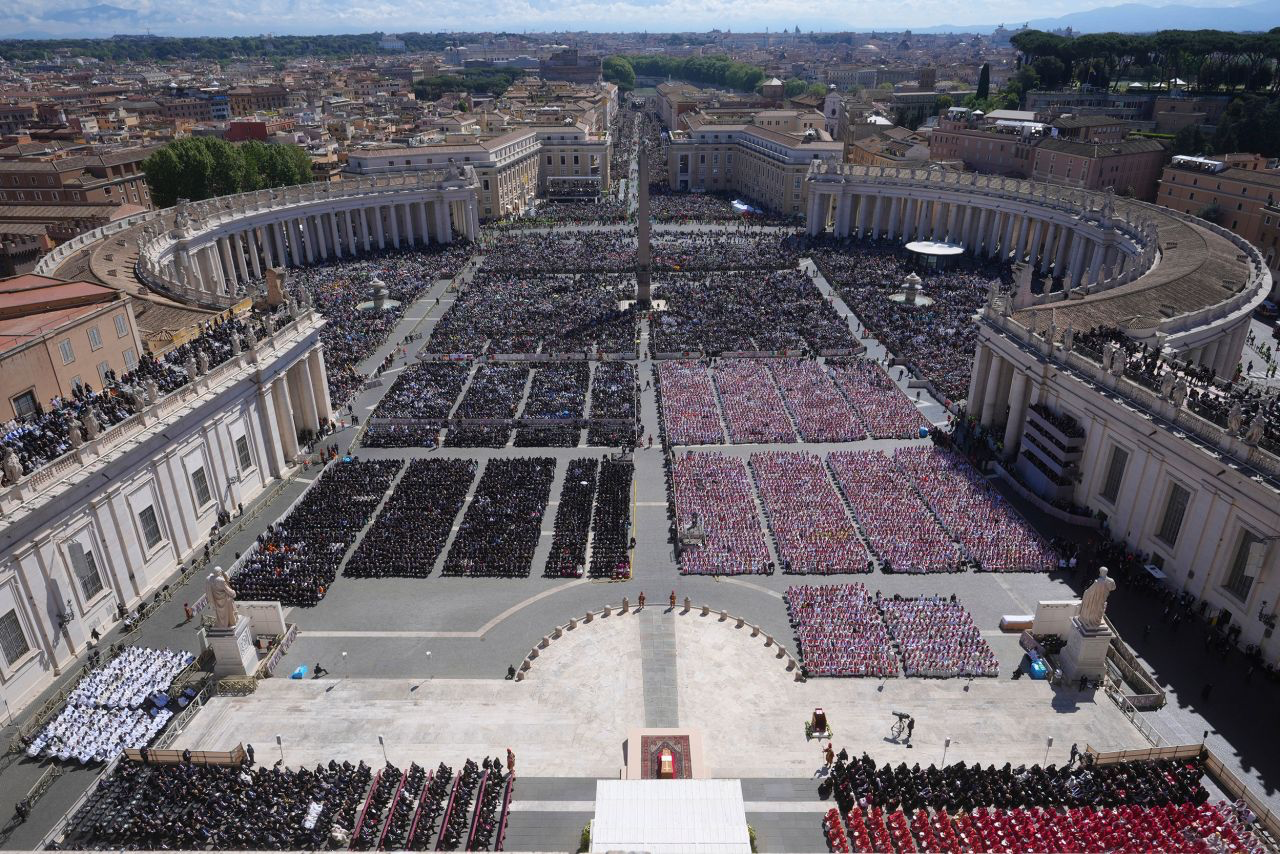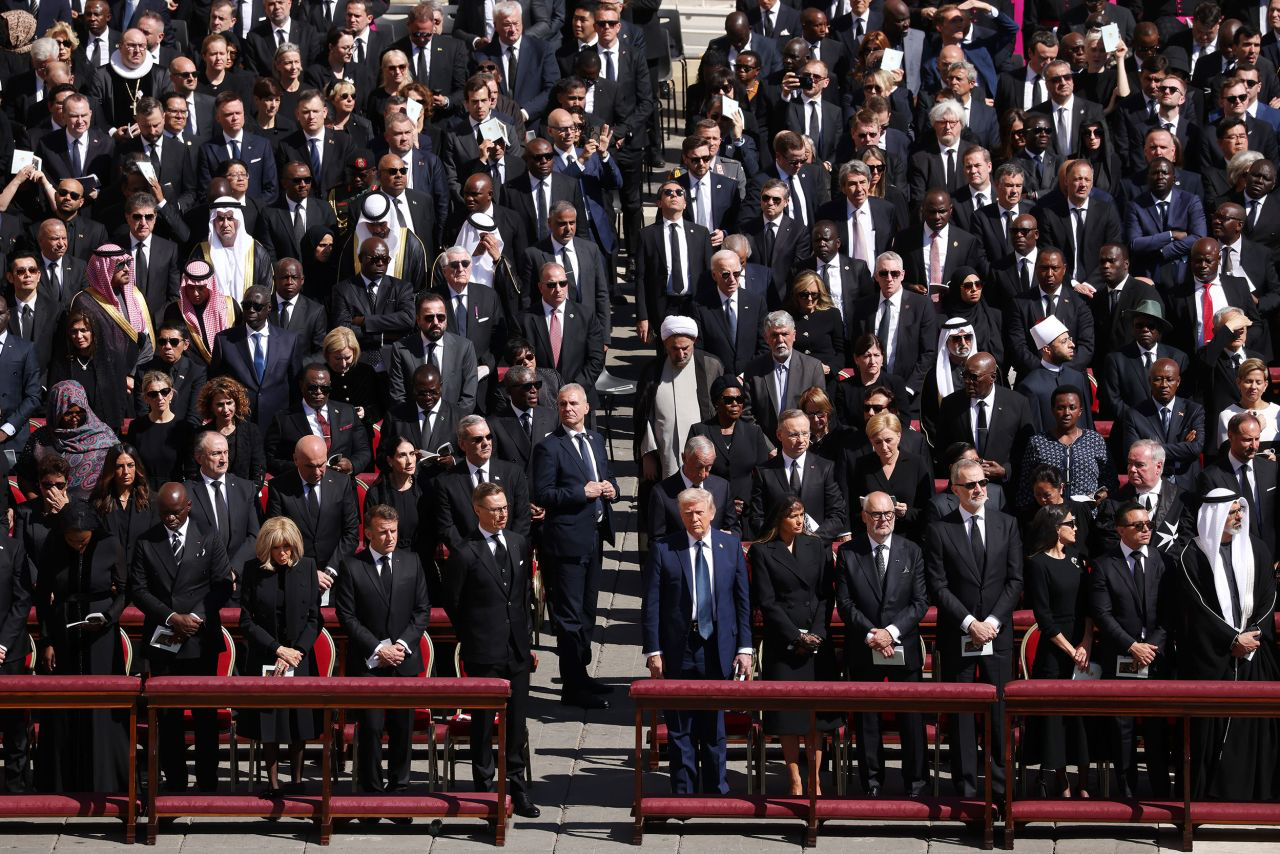
This photo, taken from St. Peter’s Basilica, shows the pope’s coffin and the crowd during his funeral (CNN).
“More than 250,000 mourners” attended the funeral service for Pope Francis at the Vatican, CNN reported. [1] The world watched as kings, presidents, prime ministers, dignitaries, and religious leaders from across the globe gathered to honor the pontiff. The global, televised Mass served not only as a memorial but also as a powerful symbol of the Vatican’s unparalleled spiritual and political influence. In a striking fulfillment of prophetic themes from Revelation, this moment reflected the world “wondering after the beast”—a system that blends religious authority with political power. The grandeur and universal reverence displayed during the funeral can be seen as a global indoctrination, reinforcing the centrality of papal authority in world affairs. This event is part of a broader prophetic scenario in which the papal power, long seen as wounded by the forces of secularism and modernity, continues to recover its influence—helping to heal the “deadly wound” and setting the stage for a final showdown over religious and civil liberty in the last days.

Dignitaries attend the pope’s funeral in St. Peter’s Square. Among the world leaders in the front row are US President Donald Trump and French President Emmanuel Macron (CNN).
Gript Media, a news outlet from Ireland, published on April 21, 2025, the following article titled “Pope Francis and the Enduring Power of the Papacy,” which stated in part:
• “The papacy is an utterly unique institution, which is something that can be readily admitted whether you’re of the faith or not. That is why it attracts the attention of not only the Catholic press, but the secular too, whenever a pope says anything notable. But also, of course, when he dies.” [2]
• “All other coverage took a backseat on most rolling news channels that I checked after Mass and throughout the day, with images from churches and holy sites around the world instead being broadcast alongside input from Church experts, and as usual, non-experts alike. I expect that fascination to continue for some weeks as Pope Francis is laid to rest and his successor is chosen and profiled.” [2]
The Pope, as the sovereign of the Vatican City State and the supreme head of the Roman Catholic Church, wields an extraordinary concentration of power—unmatched in modern political systems. He holds ultimate authority over all three branches of governance: judicial, legislative, and executive. There are no checks or balances on his power within the Vatican; laws are enacted at his will, judicial decisions are subject to his approval, and the administrative functions of the state answer directly to him. In this sense, the Pope embodies a form of absolute rule that dictators and tyrants throughout history have aspired to but rarely achieved—a singular figure whose word is law, whose decrees are final, and whose authority is unquestionable within his domain.
The Vatican is an unparalleled institution in the modern world, functioning both as the headquarters of the Roman Catholic Church and as an independent sovereign state with international recognition. This dual identity represents a formal union of church and state, where religious authority and political sovereignty are merged under the leadership of the pope. As such, the Vatican is actively promoting a vision of governance in which religious values and ecclesiastical authority play a guiding role in civil society. This model stands in stark contrast to the foundational principles of the American republic, where the separation of church and state is enshrined as a safeguard of both religious freedom and civil liberty. The American experience is supposed to treat religious influence in government with suspicion, while the Vatican exemplifies a system where church and state are intentionally and institutionally intertwined.
“Satan is still working through every means which he can control to destroy religious liberty. The antichristian power which the protesters of Spires (Protestants) rejected, is now with renewed vigor seeking to re-establish its lost supremacy. The same unswerving adherence to the Word of God manifested at that crisis of the Reformation, is the only hope of reform today” (Great Controversy, p. 204).
“Protestants have tampered with and patronized popery; they have made compromises and concessions which papists themselves are surprised to see and fail to understand. Men are closing their eyes to the real character of Romanism and the dangers to be apprehended from her supremacy. The people need to be aroused to resist the advances of this most dangerous foe to civil and religious liberty” (Great Controversy, p. 566).
Sources
[1] https://www.cnn.com/world/live-news/pope-francis-funeral/index.html
[2] https://gript.ie/pope-francis-and-the-enduring-power-of-the-papacy/
Leave a Reply